#Jean-de-Dieu Soult
Text
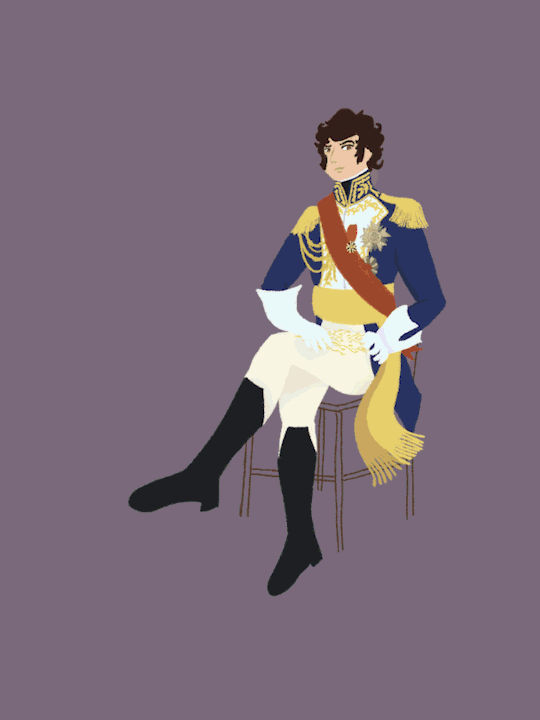
it is alleged napoleon on saint helena said jean-de-dieu soult should have been shot for his plundering
maybe he should also have been framed and and hanged on a wall.
high resolution stills under the cut.
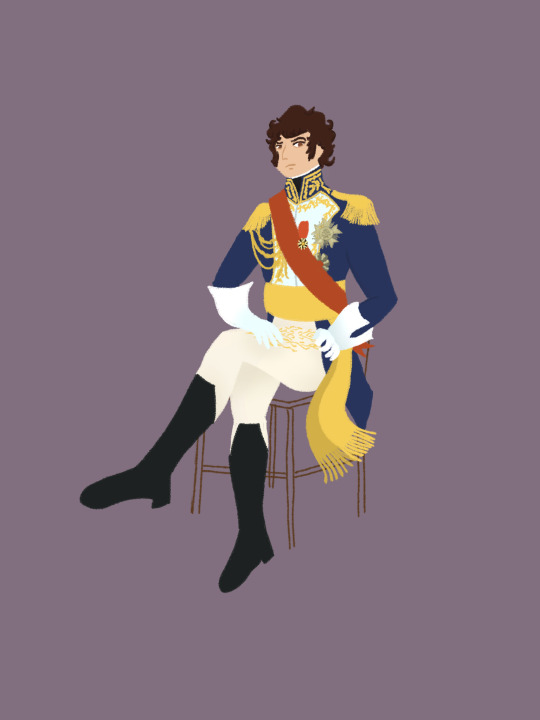

babby's second animation
ended up keeping dithering on because the nondithered version had better colours but also did not play nicely with my shading fuck it
thanks to @impetuous-impulse for suggesting the pun on coupable (guilty) and coup (cut)!
happy birthday soult! im going to continue drawing and writing weirder shit of fictionalised you
oh yeah the french says "Je sais ce dont ils me jugent coupable." which the machine assures me means "I know what they find me guilty of" but possibly in a stilted/formal manner, welcoming suggestions/corrections though!
#jean-de-dieu soult#jean de dieu soult#napoleon's marshals#napoleonic wars#cadmus draws#cadmus animates?#the thing is that because lannes and soult are my favs i end up experimenting with lannes first and then refining the process with soult#need to redo the lannes body pillow to be better
68 notes
·
View notes
Text
Post-Austerlitz Complaints and Recriminations

(aka Imperial Alert: The girls are fightingggg)
"After Austerlitz, as after Ulm, there was a rich crop of mutual complaints and recriminations among the Marshals. A bitter feud between Bernadotte and Davout was developing and there were respective rows between Lannes and Soult, Soult and Davout, and Murat and Lannes. To crown everything Lannes to offense at the Emperor's bulletin which he felt, gave insufficient credit to the work done by Lannes' corps, and took himself off on a prolonged, self-awarded leave. It is significant that while Napoleon was swift to punish dereliction of duty by his Marshals in future years, he let this peccadillo pass."
(Humble, Richard. Napoleon’s Peninsular Marshals. 1975.)
#Napoleonic Wars#Napoleonic Era#Napoleon Bonaparte#Jean-Baptiste Bernadotte#Marshal Bernadotte#Louis-Nicolas Davout#Marshal Davout#Jean Lannes#Marshal Lannes#Jean-de-Dieu Soult#Marshal Soult#Joachim Murat#Marshal Murat
45 notes
·
View notes
Text
Some old funny illustrations that I’ve probably already shared
Okay since there’s been a resurgence of interest in the Napoleonic Wars, my old content was constantly reposted so I thought I shall show you the deepest parts of the fandom:
BEHOLD THE LORDS—




#it’s been a long time coming#jean baptiste bessières#andre massena#jean lannes#jean-de-dieu soult#marshal cupcake#ravioli lord#ladder lord#bread man
39 notes
·
View notes
Text
At What Point Did Ney and Soult's Relations Become So Embittered?
The more I find out how Ney and Soult are mentioned and perceived (in relation to each other) in the Napoleonic timeline, the more I am convinced that they were on decent terms up until the Empire was well-consolidated. This is mostly a response to this episode, which takes place four days before Napoleon's coronation. During that time, Soult was commandant-in-chief of the Camp of Boulogne and Ney was commandant-in-chief of the left wing of the army at the Camp of Montreuil. They mst have corresponded and cooperated well with each other on various matters, at least on a professional level. Attridge’s Ney biography has an episode about a hay bale conspiracy by the English that necessitated communication between both camps. Hayman, in his Soult biography, even hedges that they were willing to play court with each other through the unpublished correspondence of General Marchand (which he frustratingly paraphrases and does not give a date for).
[...] Marchand accompanied his own chief, Ney, to dinner with the Soults, indicating that these two rivals from the Sambre-et-Meuse were still on social terms. The dinner was followed by a magnificent ball given in honour of Louise Soult, who appeared in an elegant black dress covered with diamonds. The ball cost some six million francs to which senior officers were asked to contribute. Marchand hoped that a similar ball would not be given in honour of Madame Ney since he and his comrades just would not be able to afford it! (p. 50)
We can infer from this letter that around 1803-1805, Soult was still civil with Ney by inviting him to a dinner, and Ney still had some sense of being an equal to Soult despite being the Commander of Montreuil. I wonder if Ney himself contributed to Soult's ball (and if he was willing).
If the primary sources these biographies use are not all too reliable, at the very least, the first big rift in Ney and Soult's relationship that I found was in Saint-Chamans’ memoirs, quoted in Gotteri's Soult biography. This was after the battle of Eylau, 3 February 1807, when Napoleon held a meeting with his Marshals to discuss objectives. As I translate in approximation below:
Marshals Murat and Ney wanted to march onto Königsberg; marshal Soult held that it was necessary to retire behind the Passarge (a small river which was difficult to pass, fifteen miles behind Eylau), to fortify the points of passage, and wait in this position so that the troops can alleviate the fatigues they had accumulated, and so the reinforcements who, in our depots in France, were in route to come join us, would arrive; the discussion was lively, and the opinion of marshal Soult prevailed; marshal Ney was very offended by this [the original word is "piqué", lit. stung], and, from this moment, they were completely at odds [lit. they always made quarrels]. (p. 181)
And even then, Ney would make his remark about borrowing Soult's culottes to Soult himself just four months later, around 6 June 1807. They were evidently still able to joke around with each other after their military disagreements, which always happens on campaign, even between civil colleagues (examples I can think of include Lannes and Murat or Desaix and Saint-Cyr). Or maybe Soult did not reciprocate Ney's jokes by 1807; I have no way of knowing right now.
33 notes
·
View notes
Note
Hello there! In the last few weeks your page turned into one of my favourite places on the internet through your knowledge and your posts about Murat and all around about the napoleonic era. I do wonder: Do you know about Murat‘s relationship with the other marshals? I am aware about your really nice post about Murat‘s relationship with Lannes but what about the others? I believe to have read that Murat disliked Davout. At the other hand he seemed to have a positive relationship with Bernadotte and Ney? I could be wrong though. I hope I do not annoy with that question and wish you a beautiful day. c:
Hello! Glad you’ve been enjoying my page, always nice to see more fans of Murat/the Napoleonic era in general popping up here. ^_^
Regarding Murat’s relationships with his fellow marshals, this is one of those subjects in which the amount of information is frustratingly sparse, so most of my views are just from piecing together what fragments I’ve come across here and there. And my guesswork may very well be wrong; my knowledge about the marshals is nowhere near complete.
Murat & Bernadotte: It’s generally been accepted that they were friends, at least early in their careers, because of their shared revolutionary sympathies and backgrounds. So I was a bit surprised to come across a letter from Murat to Joseph Bonaparte, which I included in my book, in which Murat says he’d resign if Bernadotte were ever given preference over him for a military command, after Bernadotte sided against the Bonapartes on 18 Brumaire. That being said, Murat had invited Bernadotte to his wedding ten months prior to writing that letter (though I’ve always wondered if this was just to nettle Napoleon for having opposed his marriage to Caroline). I really haven’t come across what their relationship was like in later years, but it would be interesting to look into.
Murat & Bessières: These two went off together, as young men from the Lot, to join the Constitutional Guard in 1792. He also attended Murat’s wedding in January 1800. Beyond that, I’ve found depressingly little on their personal relationship. Bessières apparently did become quite close with Eugène de Beauharnais, which does make me wonder if his relationship with Murat might’ve soured at some point, since poor paranoid Murat tended to be one of those “the friend of my enemy is also my enemy” types. Nevertheless, he and Caroline both wrote letters to Bessières’ widow after his death in 1813; sadly I’ve never been able to read them, since they’re in the French Archives.
Murat & Ney: At least during the 1805 campaign, these two didn’t get along very well. Shortly after Murat’s victory at Wertingen, Napoleon placed the entire right wing of the army (which included the corps of Lannes and Ney) under Murat’s orders, which neither Lannes or Ney were happy about. At one point Ney argued with Murat over his dispositions and whipped out a map to show Murat why he was wrong, to which Murat said “I understand nothing of your plans; it is my way to make mine in the presence of the enemy!” The remark stung Ney enough that he threw it back at Murat prior to the attack at Elchingen, in front of Napoleon, turning to Murat and shouting, “Come, Prince, come with me, and make your plans in the presence of the enemy!” But a lot of the campaign-tension stuff shouldn’t be read too deeply into when it comes to analyzing friendships; Murat and Lannes butted heads on campaign too. War is stressful, and generals/marshals wanted to show each other up and win the most prestige. Ney still took the waters at Barèges with Lannes and Murat in July of 1808, so Lannes and Ney were two of the first people with whom Murat got to share the wonderful news that he was officially a king now. I don’t think Murat and Ney ever became particularly close friends, but they at least seemed to get along, and work together, better during the 1812 campaign.
Murat & Soult: Apparently disliked each other, but I haven’t found much mentioning them in relation to each other either way. @josefavomjaaga has posted some excerpts from the memoirs of one of Soult’s aides which mention Soult’s displeasure with Murat though.
Murat & Davout: Their mutual dislike really seems to have crystalized during the 1812 campaign, in which they quarreled repeatedly (at one point Murat wanted to fight him, and Belliard held him back as he was about to head for Davout’s tent with a pistol), culminating with Davout accusing Murat of “black ingratitude” towards Napoleon when Murat was ranting about him at one point. I think they were just an oil-and-water pair, totally incompatible with each other personality-wise, and I also think it grated on Davout (and probably many of the other marshals) that Murat had been made a king by Napoleon by virtue of being an imperial brother-in-law, and that they officially had to refer to him as Your Majesty from then on.
Murat & Berthier: This is an interesting one, and I wish I had more information. Early on, Murat disliked Berthier and seemed to think Berthier had it out for him (and maybe he did, since Murat admitted to having spoken against him; but, again, Murat was kind of a paranoid wreck and thought virtually everybody had it out for him). Between this and the fact that his relationship with Napoleon was on an early down-turn, Murat actually wrote to Barras at the beginning of the Egyptian campaign (I believe from Malta) and asked to be reassigned. At some point though, his relationship with Berthier improved. There are some interesting letters from Berthier to Murat in Murat’s published correspondence which speak to them having a closer relationship. In one, I can’t remember the year off the top of my head but I want to say sometime between 1806-7, Berthier says that he misses the lunches they used to share together. In another from around that time or perhaps 1808, Berthier laments that Murat has been nonresponsive to his previous letters and is clearly wounded by it. In the summer of 1808, Berthier writes Murat another touching letter as Murat is about to become a king, and Berthier regrets that soon he will not be able to write to him with the same effusion. Throughout Murat’s reign, Napoleon would typically leave it to Berthier to kind of “soften the blow,” so to speak, when it came to giving Murat lectures on how he should behave as a king, and to try to soothe his hurt feelings after Napoleon’s typically insensitive reprimands. They both endured Napoleon’s stormy moods during the 1812 campaign and had to figure out how to pick up the pieces together once Napoleon abandoned the army. Berthier initially supported the choice of Murat, due to his rank, to take command rather than Eugène, but soon realized Murat wasn’t capable of handling it, and wrote a ciphered letter to Napoleon saying that he needed to be replaced immediately. I don’t think it was personal; Murat was just terrible under pressure, and wasn’t the right man for that particular job. Anyway, I think anyone would be hard pressed to find two guys who put up with more of Napoleon’s shit over the years than Berthier and Murat, and after 17 or so years of working so closely together and going through so much shared hardship, I can’t help but think they had bonded at least a bit.
Those are the main ones; as far as the other marshals, I haven’t come across enough info on Murat’s relationships with them to have anything to say. If anybody has any more information to add on anything, feel free. :)
Thanks for the ask!
#asks#Napoleon's marshals#Joachim Murat#Louis-Nicolas Davout#Michel Ney#Jean-de-Dieu Soult#Louis-Alexandre Berthier#Jean-Baptiste Bessières#Bernadotte
58 notes
·
View notes
Text
2022 Tumblr Top 10
1. 75 notes - Apr 9 2022

2. 49 notes - Jan 29 2022
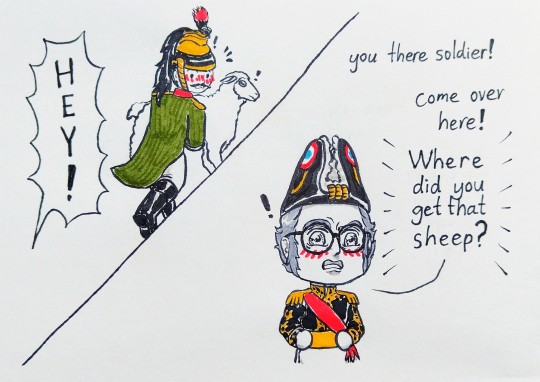
3. 47 notes - Nov 2 2022

4. 43 notes - Feb 1 2022

5. 40 notes - Jul 18 2022
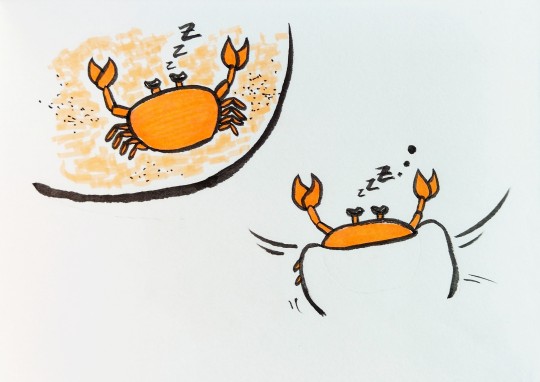
6. 33 notes - Jun 14 2022

7. 29 notes - Mar 29 2022
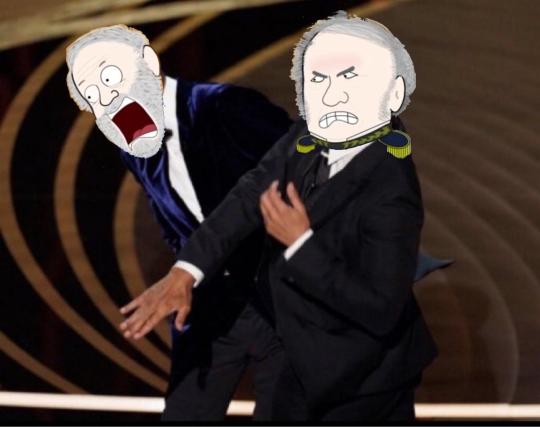
8. 27 notes - Sep 25 2022

9. 27 notes - Feb 8 2022
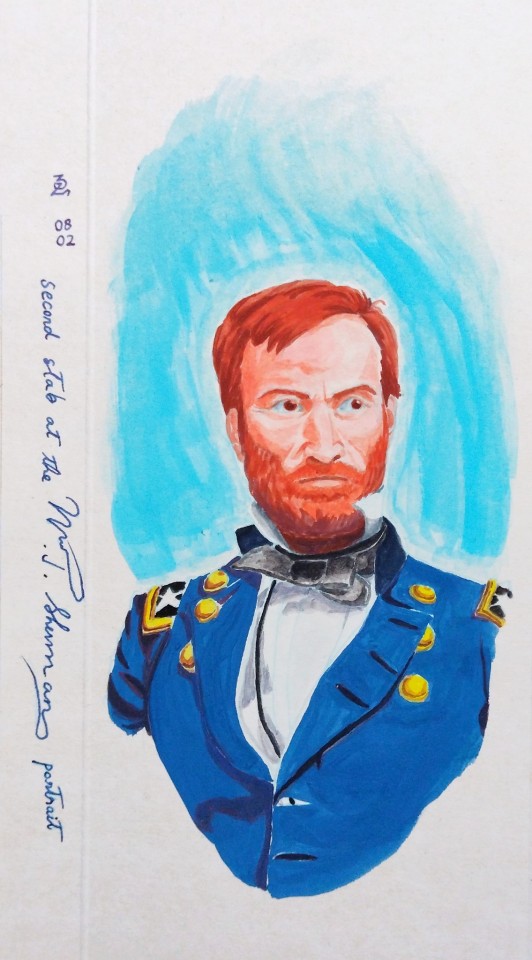
10. 27 notes - Jan 10 2022
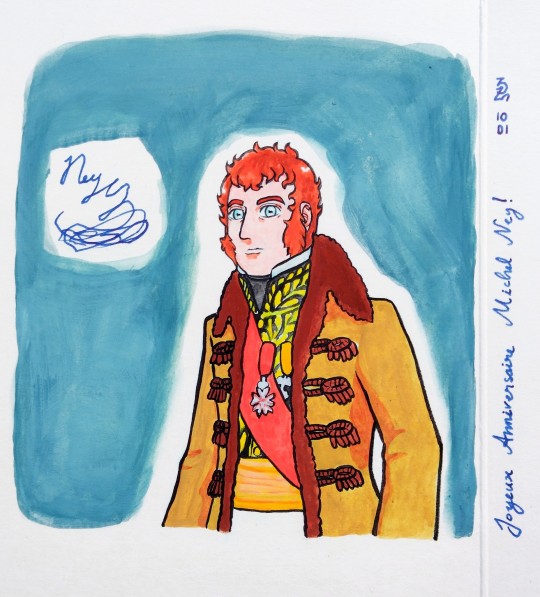
Created by TumblrTop10
#tumblrtop10#sorry for the spam but...#this is quite amusing 🙈#(iirc this is different from the one tumblr provided here back then... 👀)#not art#napoleonic#american civil war#american history#ulysses s grant#louis-nicolas davout#josephine bonaparte#napoleon bonaparte#william s harney#winfield scott#jean-de-dieu soult#william tecumseh sherman#michel ney#joachim murat
10 notes
·
View notes
Text
Rumours about Soult's wealth, 1816
Newspaper snippets fom January 1816, immediately before Soult is exiled from France:
Regensburger Zeitung, 9 January 1816
Marshal Soult, establishing himself in Belgium, is said to bring with him a fortune of 27 million francs!
This newspaper article was repeated and embellished by several papers over the next two weeks, to the point of some people claiming to have seen Soult in Brussels at a theatre.
Meanwhile, in Saint-Amans:
Soult to his wife, 10 January 1816
[...] The future frightens me. I don't know how we will be able to ensure our existence and provide for our children's education, until we have liquidated the capital represented by our Villeneuve countryside, the house in Paris and the furniture that belongs to it, in order to convert it into land that produces some income or annuities on the State, for which the interest would be guaranteed. [...]
Interestingly, he does not even mention selling his Spanish paintings.
16 notes
·
View notes
Photo

i tried make a design of Soult to finally understand how to draw him the way i imagine him although in nature there are no two similar snowflakes or Soults......
#my favorite ver at the moment is the far left#but i also like the design with bangs#headcanon: soult has a cane with blade#jean-de-dieu soult#napoleon's marshals
43 notes
·
View notes
Text

Happy birthday!
16 notes
·
View notes
Text
A quick biographical sketch of Soult
This is my seventh post regarding the Marshals listed in an article about Napoleon’s ability to spot talent. The article is taken from the September 2019 issue of Historia magazine, bearing on its front page’s the title “Napoleon, les secrets d’un chef de guerre”.
After Berthier, Davout, Lannes, Masséna, Murat, and Ney, Soult is the next Marshal on the alphabetized list of the eight highlighted Marshals:
Soult, the independent one
His rise was less meteoric [than Ney's?], but by age 30 his talents for military manoeuvres were clear to see. Methodically, he would make the adversary retreat until he crushed it utterly. In the year 1805 his attacks were sharp and forceful. At Austerlitz he cut the Austro-Russian enemy in two. In 1808 Spain, the English troops fled before him. He behaved similarly in Portugal, although the Englishman Wellington succeeded in driving him out. The duel between these two men has only just begun, ending with Soult's defeat in Toulouse. Under Louis-Philippe, Soult became head of government, a position he held for more than nine years - a record for longevity.
Here the author was unclear about a few matters: Whose rise is Soult’s compared to? What was a “head of government” at the time of Louis-Philippe? And once this question is answered, that record of longevity refers to what: the record for longevity at the time, or the record for longevity ever?
Soult died in his bed at age 82. He has seen all the other Marshals die before him except for Marmont, who died the next year.
22 notes
·
View notes
Text

These four seem to be the most popular marshals in this fandom… So they shall unite.
#napoleon’s marshals#napoleonic wars#napoleonic era#michel ney#joachim murat#jean de dieu soult#jean lannes#slowly breaking my vow to never draw historical ppl#with cutesy artstyle#my art
219 notes
·
View notes
Text
Analysing the Quality of Napoleon's Marshals With Silly Data Science
Let's talk numbers and laugh at funny graphs with missing data!

Other people in this fandom do really lovely detailed information posts, I do weird fanfic, dragon shitposting, body pillow design shitposting and run a stupid Lannes ask rp blog. But! I'm also a programmer with an interest in Numbers, and today we're going to Analyse These Dead Frenchmen with a bunch of screenshots of graphs.
Ethan Arsht published a really interesting article called Napoleon was the Best General Ever, and the Math Proves it., where using data scraped off Wikipedia articles, he creates a statistical model drawing from multiple variables per battle to calculate How Good A General Is At Winning.
Give the article a read, it's great stuff, but if you don't feel like it, he basically applies WAR - "Wins Above Replacement" - which is a value from baseball that measures how many wins a player is worth when compared to a replacement.
So the general's WAR would be how well they compare to a completely average general who replaced them. Yes, as Arsht says, "in other words, I would find the generals’ WAR, in war."
But as he says, this is not a stringent historical analysis and is more of a fun thought experiment. Wikipedia is probably the most comprehensive dataset on this topic that he had access to, but it is Wikipedia the crowdsourced online encyclopedia, so it is going to have holes and inaccuracies. And this was written seven years ago, and the data was collected then, so any updates to these articles since then wouldn't be reflected.
And it's not a perfect model that takes into account everything - it's an approximation, a whole bunch of number crunching. I haven't looked too deeply into how the numbers work exactly, even though I could.
I think that 0 would be "completely and utterly average"? A positive WAR is good, a negative WAR is not. Napoleon is the best general ever at 16.679 WAR, the next highest is Caesar at 7.445 WAR.

(Link, you can hover over each battle and look at each datapoint!)
But I'm interested in Napoleon's marshals. The 26 men he raised up to military nobility! The dramatic assholes who kept arguing with each other. I'll post links for all of them at the end of this, but I won't be screenshotting each of their WAR graphs, just a few.
I'm not entirely sure how the scraper collected the information about what battles a commander is considered in "charge" of - I tried looking at the provided code repository but I am reminded that data science people bless them are not really good at structuring or publishing code and why are all the html pages just straight up saved in the root folder why are the jupyter notebook outputs just uncleared aaaaaaaaaaaaaaa
Oh yeah this was scraped from seven years ago so current wikipedia pages won't be reflective of what's on the graphs - so we can assume that this is just grabbing stuff from the "Commanders and leaders" part from each individual battle page and collating them into numbers
Anyway let's look at the iron man himself, Davout, considered to be the best of Napoleon's marshals.

(Link)
Heh, here we see the first hole in the dataset - Jena-Auerstedt is considered to be one battle, and Napoleon would like you to think that's the case.
Anyway, pretty good! Let's look at Jean Lannes, the lively Gascon
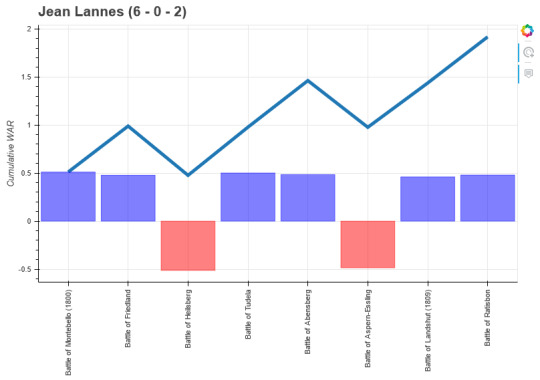
(Link)
Oooooh, even better than Davout! Helps he didn't go to Russia. Wait, why is Aspern-Essling dated to before Ratisbon, especially when Lannes died in the former?
Let's look at André Masséna, also known as being pretty cool:
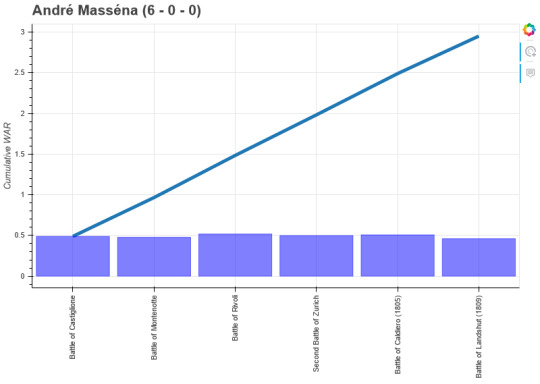
(Link)
Damn, neat, though I think there's a lot of omissions here.
Here's Murat:
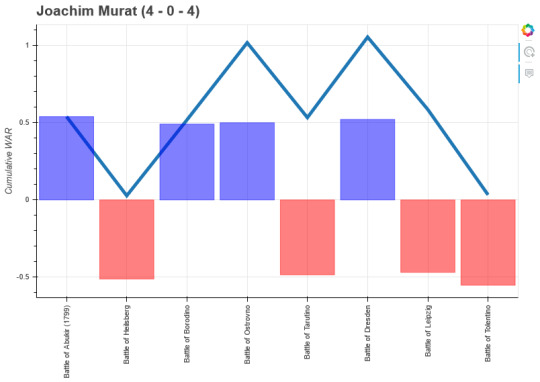
(Link)
Lol Tolentino, I do like how Murat Peaked there a little bit
But we're forgetting a certain redhead, aren't we?

(Link)
Ouch. But also Waterloo not appearing there, hmmm.
Anyway let's finish off the screenshots with Napoleon's greatest strategist, Jean-de-Dieu Soult, the man that Wellington called a master of the defensive!

(Link)
honestly this is the entire reason why i wanted to write this post
in soult's defense - as a soult defender - he had a pretty shitty army full of conscripts, was isolated, was occasionally pretty bad at adapting tactically to new surprises and had to deal with the english being stubborn fuckers, but he was brilliant in setting things up strategically and forcing the english to catch up through a fighting retreat with a demoralised army, stopping them from closing in on france too
but also the way this graph bullies soult so hard makes me laugh a lot
Anyway, yeah, these graphs are definitely inaccurate and I'm also posting these to see the Napoleonic community on tumblr's reaction to them, but they are a fun way to engage with history!
Just don't take them seriously, and feel free to argue in the tags/comments/reblogs
I could theoretically use this guy's code to rerun this just for the Marshals now - I know my way around some data science code - but I do have a lot on my plate, but it would be a fun experiment!
Marshal WAR Graph Links
Note: So these are under the Wikipedia article names at the time that the web scraper was run seven years ago so some of these names turned out to be different from what they are now and I had to do a bit of digging to fix some
you can definitely tell that the information is incomplete on a lot of these, again i repeat the information was scraped off wikipedia seven years ago
Louis-Nicolas Davout
Jean Lannes
Joachim Murat
Michel Ney
André Masséna
Jean-de-Dieu Soult
Bon-Adrien Jeannot de Moncey (one battle lol)
Jean-Baptiste Jourdan
Charles-Pierre Augereau
Jean-Baptiste Bernadotte aka Charles XIV John of Sweden (Two battles and only Swedish ones I think)
Guillaume Brune
Édouard Mortier (two battles)
Jean-Baptiste Bessières (two battles)
François Christophe de Kellermann (one battle, Valmy)
François Joseph Lefebvre (two battles)
Charles-Victor Perrin (ouch)
Étienne Macdonald
Nicolas Oudinot (lol)
Auguste de Marmont (loll)
Laurent de Gouvion Saint-Cyr
Józef Poniatowski (three battles but hmm. pretty bad but feel like there's too much missing info here)
Emmanuel de Grouchy (two battles, can't make a Where's Grouchy joke)
Marshals Without Graphs
Not because they didn't command anything but I couldn't find their graphs on the website or in the code repo
Catherine-Dominique de Pérignon
Jean-Mathieu-Philibert Sérurier
Louis-Gabriel Suchet (wtf? maybe seven years ago the documentation on him was sad)
EDIT: wait i was looking at the notebook (the uh place where the code was being run, to see if i could run the code myself)

soult is one of the lowest ranked generals overall on this initial list pfftHAHAHhahahahahahahaha
#napoleon's marshals#napoleonic era#napoleonic wars#napoleonic shitpost#cadmus rambles#cad rambles about dead frenchmen on main#jean lannes#louis-nicolas davout#joachim murat#michel ney#andre massena#im not tagging all of them#jean-de-dieu soult
35 notes
·
View notes
Text
Amusing (to me) Description of Soult

"A curious type of man, this Soult; a soldier with the temperament of a politician. The son of a notary, he had a very sketchy classical education, but had acquired a taste for pompous proclamations. He had a haughty manner which went with his severe mien - although he did not look people in the face. As with many senior officers raised under the Revolution, money did not displease him. His contemporaries spoke with admiration, or with snigger of envy, of the magnificent balls followed by suppers which he gave in 1800 at the Duke of Aosta's palace at Turin in honour of a singer about whom he was besotted.
Later, his immense fortune, which Napoleon was not alone in regarding with reservations, allowed him to fulfil his obligations opulently. People did not visit him solely to dine or sup, but also to admire - with murmured observations - his superb picture gallery."
Georges Blond. La Grande Armée. 1997.
#I just really enjoy making collages what can I say 😂#Anyway I found this a little amusing to read.#Jean-de-Dieu Soult#Marshal Soult#Napoleon's Marshals#Napoleonic Era#Napoleonic Wars
36 notes
·
View notes
Text

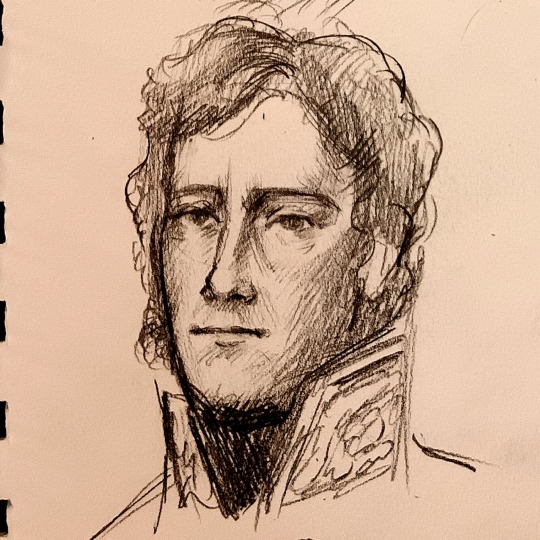




drew these silly sketches just to post here on tumblr :3
#napoleon#napoleonic wars#art#sketch#michel ney#jean de dieu soult#louis nicolas davout#joachim murat#ney looks so done with life
110 notes
·
View notes
Text
Ruthless Representatives, Unjust Executions (1/3): the Death of an Artillery Captain
This is a response to @josefavomjaaga's recent post, which partially deals with the alleged arrest and execution of an artillery captain by Saint-Just, then a representative on mission, during the siege of Charleroi, and the representatives' abuse of military men around the time of the battle of Fleurus. Josefa enquired whether anyone could shed light on this incident from the FRev community. While I am not well-versed in FRev events, I would like to offer some of my findings about military justice in the army during the Revolution in relation to the representatives in three parts. The first part deals directly with the tale of Saint-Just's execution of the artillery captain, and how it was turned into a symbol that exemplifies the Revolution's extrajudicial violence. All translation errors are my own.
The source about Saint-Just's terrorisation and execution of the artillery captain that is cited the most is from Soult’s memoirs (1854). Writers, including Colonel Phipps, use this source verbatim without questioning it, because Saint-Just and all the representatives were obviously Stupid Civilians who thought that any incompletion of their orders amounted to betrayal:
It was above all the siege division which deployed with activity before Charleroi. The colonel Marescot directed the engineering operations, under the eyes of Generals Jourdan and Hatry; we had a sufficient artilery crew, and the representatives Saint-Just and Lebas stood at the foot of the trench to speed up the work. One day, they visited the site of a battery that had just been marked out: "At what time will it be finished?" asked Saint-Just of the captain responsible for having it executed. "That depends on the number of workers that I will be given; but we will work relentlessly," responded the officer. "If tomorrow, at six o'clock, she is not ready to fire, your head will fall off!..."
In this short time, it was impossible for the work to be completed; even though as many men were put there as the space could contain. It was not entirely finished when the fatal hour struck; Saint-Just kept his horrible promise: the artillery captain was immediately arrested and sent to his death, because the scaffold marched in the wake of the ferocious representatives. (pp. 156-157)
Saint-Just, in Soult's depiction, is the proper Archangel of Death, guillotining everything that stands in his path. In portraying Saint-Just thus, Soult criticizes the representatives' murder of an innocent man. Worse, he depicts representatives as civilians that can only stand around instead of hardworking soldiers bringing the siege to fruition, making their commands unjustified. Soult condemns the fact that a civilian's word could be the injust law that separated soldiers from life or death.
That said, as Soult is no friend of the political figures of the Revolution, his remembered account requires precise corroboration to be valid. I found one earlier source that describes, presumably, the same incident, from Victoires, conquêtes, désastres, revers et guerres civiles des Français, de 1792 à 1815, vol. 3. It was written in 1817 by "a society of soldiers and men of letters", and edited by Charles Théodore Beauvais de Préau, a general of the Revolution and Empire. Though this anonymisation may have been taken to avoid the wrath of the Bourbons in the Restoration, it means we have no idea who wrote the following section, nor their intentions:
This fierce man [Saint-Just], who never showed himself in the trench, informed that a captain of the first regiment of artillery had been somewhat negligent in the construction of a battery of which he was in charge, had him shot in the trench. At the same time, he gave General Jourdan the order to arrest, and consequently have shot on the spot, the General Hatry, commander of the besieging troops, the General Bellemont, commander of the artillery, and the commander Marescot. The General Jourdan had, at the risk of his own life, the courage to resist the wishes of this gutless representative. The officers of whom we have just spoken of had the audacity of protesting against the cruel sentence which condemned the unfortunate artillery captain Méras, and, in his his atrocious delirium, Saint-Just dared to accuse them of complicity. (p. 47)
If we infer from the title of this source that the editor compiled the accounts of his comrades, then this account was written by a former Revolutionary and Imperial officer who could have some memory of the incident. However, many aspects of this text don’t line up with Soult’s account, including the way the captain was executed (shot in the trench here, guillotined in Soult's account). Saint-Just's successive condemnation of high-ranking officers, which highlights how much power he had over even the highest echelons of the army, also does not appear in Soult's account. But we do have a name for the captain: Méras. His name, in fact, appears in a 1797 publication: L'observateur impartial aux armées de la Moselle, des Ardennes, de Sambre et Meuse, et la Rhine et Moselle, a memoir by Pierre Charles Lecomte, at the time "the conducteur general of the artillery in the Army of the Rhin-Moselle [sic]". This is his account on the affair, relegated to a footnote:
Before giving the details of the capitulation of Charleroi, I must cite a horrible feature of the role of Representative Saint-Just.
The French proconsul ordered the construction of a battery that he thought was necessary.*
The general Bollemont [sic] entrusted its execution to an artillery captain, named Méras. All the shovels, pickaxes, and other utensils happened to be employed in other work, the orders of the Representative could not be executed. The morning of the next day, passing close to the location where the battery was supposed to be constructed, he [Saint-Just] shouted, raged, sent to search for the captain; and, without listening to his reasons, he had him arrested. Two days later, when his [Méras’] company was battling against the enemy, he [Saint-Just] had him taken from the prison, he had him conducted to the middle of his works; and there, o misery! o inhumanity! he had him assassinated. At night his company returned to the camp covered in glory; they learned that their chief had been shot; they surrendered to despair. They wanted to go to the tyrant: they were stopped, under the fear that some of these brave soldiers would have become new victims. Méras was so much loved, that all of the artillery wanted to enact vengeance on his assassin. This almost universal rumour made itself heard amongst the trenches; and, for preventing it from having consequences, the company of the unfortunate Méras was sent into the interior.
*We know that there was a time when the Representatives, often little-instructed in the military arts, dared impudently to command old soldiers whose arms had dulled, and obliged them to sacrifice, according to their whims, some thousands of brave soldiers. (p. 38-39)
Once again, the details contradict even more with Soult’s account, and with that of the 1817 one. Soult says as much help as possible was given to the artillery captian, but Lecomte says all other workers were occupied and that captain received little help (presumably because the battery was militrarily unimportant). Méras’ misery is stretched out over two days instead of him being shot immediately, and it is not the generals who protested against Méras' execution that Saint-Just raises a hand against, but Méras' entire company, which the civilian government sends to the Vendée. The message could not be clearer: under "tyrannical representatives" like Saint-Just, the Revolution is eating its soldiers, the common people it was supposed to protect.
Is this the truth of the matter, since it is the earliest version? The publication is contemporary enough, but I am inclined to doubt the reliability of a text explicitly titled “impartial”. A look at the author's background reveals his attitudes. Lecomte was, according to BnF data, the maître de pension in Versailles until 1792 (presumably up to the abolishment of the monarchy), then the inspector of octroi taxes in Paris until 1815. Seeing that he served the First Empire, I am inclined to think that he was no die-hard revolutionary, and certainly not part of the Montagnard faction. Furthermore, he published his account after the fall of the Montagnards, during the height of the Directory. This makes the affair more likely to be Thermidorian propaganda, and indeed Lecomte even admits that his account was an “almost universal rumour”, not a fact, because in his story, no one is present at the scene of Méras’ death other than Saint-Just and his executioner. This makes the account unverifiable, and makes it more likely to be fabrication.
It would seem that, after Saint-Just’s death, the army’s fear and hatred of representatives turned into slander against their characters, often resulting in widely circulated variants of the same tale to emphasise different effects. The 1797 version highlights Saint-Just’s cruelties as a tyrant against the “small folk” of the Revolution and uses exclamatory language to amplify the reader's pathos. The 1817 version emphasises Saint-Just’s power over even the generals of the army, exaggerating his dictatorship. Finally, in Soult’s memoir, Saint-Just is not just a dictator who could dismiss soldiers with a wave of a hand. He and the representatives were synonymous with the guillotine and the excesses of the Revolution themselves.
The accounts of Saint-Just condemning Méras to death are inconsistent, and should amount to nothing more than invalid hearsay, which tells us nothing of the representatives' historical actions. If anyone has more information on the topic or the wider subject, feel free to add to this.
19 notes
·
View notes








